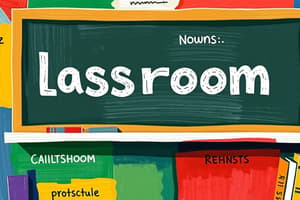Podcast
Questions and Answers
Which part of speech represents objects, people, places, ideas, emotions, or actions?
Which part of speech represents objects, people, places, ideas, emotions, or actions?
- Adverbs
- Nouns (correct)
- Verbs
- Adjectives
What do singular nouns refer to?
What do singular nouns refer to?
- More than one thing
- Several emotions
- One person, place, thing, or idea (correct)
- Multiple persons
Which of the following is an example of a plural noun?
Which of the following is an example of a plural noun?
- Chair
- Book
- Trees (correct)
- Tree
What are words that have opposite meanings known as?
What are words that have opposite meanings known as?
Which type of words can have similar meanings or replace each other without changing the sentence's meaning?
Which type of words can have similar meanings or replace each other without changing the sentence's meaning?
Which of the following is an antonym of 'fast'?
Which of the following is an antonym of 'fast'?
'Joy' and 'Sadness' are examples of what type of words?
'Joy' and 'Sadness' are examples of what type of words?
'This', 'That', and 'These' are examples of what type of pronouns?
'This', 'That', and 'These' are examples of what type of pronouns?
'Small' and 'Big' are examples of what?
'Small' and 'Big' are examples of what?
'Their', 'Her', and 'My' are examples of what type of words?
'Their', 'Her', and 'My' are examples of what type of words?
Flashcards are hidden until you start studying
Study Notes
Nouns
Nouns are parts of speech that represent objects, people, places, ideas, emotions, or actions. They can function in different ways within sentences, such as subject complement, direct object, indirect object, appositive, possessive, or adverbial modifier. In English grammar, they are classified into two main categories based on their number: singular nouns and plural nouns.
Singular Nouns
Singular nouns refer to one person, place, thing, or idea. Examples include: cat, dog, tree, chair, book, apple, happiness, sadness, and courage.
Plural Nouns
Plural nouns refer to more than one person, place, thing, or idea. Examples include: cats, dogs, trees, chairs, books, apples, happinesses, sadnesses, and courages.
Synonyms
Synonyms are words that have similar meanings or can replace each other within context without changing the meaning of the sentence. For example, some synonyms for "book" include tome, volume, and manuscript. Synonyms can be useful for adding variety, emphasis, or clarity to writing.
Antonyms
Antonyms are words that have opposite meanings. For example, "hot" is an antonym of "cold," and "happy" is an antonym of "sad." Antonyms are essential in understanding the meaning of a word and can help clarify contexts.
Demonstrative Pronouns
Demonstrative pronouns are pronouns that show or demonstrate a noun or pronoun. They include words like "this," "that," "these," and "those." Demonstrative pronouns are used to refer to specific people, places, or things by pointing or gesturing.
In summary, understanding the basics of nouns, their synonyms, antonyms, and demonstrative pronouns can significantly improve your writing skills and help you communicate more effectively.
Studying That Suits You
Use AI to generate personalized quizzes and flashcards to suit your learning preferences.




